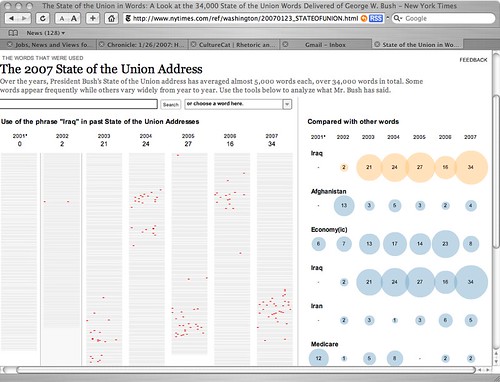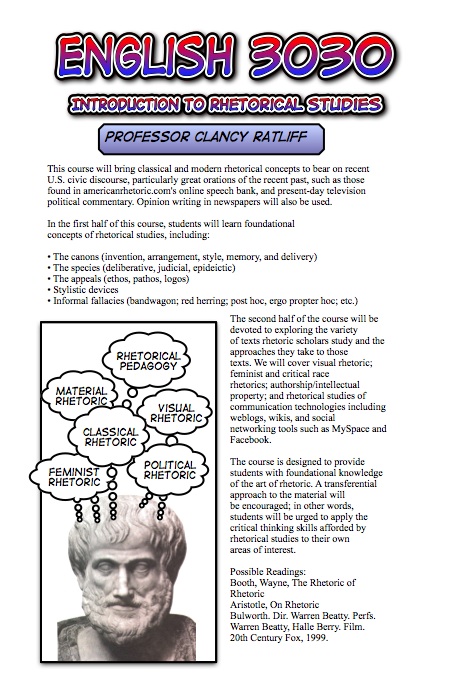The comp class blogs didn't go so well this semester. It wasn't a disaster by any means; it's just that the participation was a lot more forced than I would have liked. I attribute this to a couple of factors:
1.) I was teaching three classes, all of which had (group) blogs, and what with my adjustment to my new job and all, I wasn't able to be as active on all of the blogs than I had been before, when I was teaching a 2-1 load. In fact, the semesters I've used blogs in my teaching before had been the ones in which I'd taught only one class. I didn't leave as many comments under posts as I probably should have. I did, of course, leave comments and post to the blog, but not as often as I had before.
2.) Facebook and MySpace. The way I have used blogs in my teaching has been as a type of community-building writing space; that is to say, community building was the primary goal of the blogging activity. I had worked to achieve this goal by suggesting topics for blog posts, but encouraging the students to blog about other topics they were interested in instead, if they chose. The class blogs were, in practice, a very expressivist environment. This worked out pretty well because the major writing assignments were research-oriented, so the blog was a space for personal writing. However, the class blog became superfluous in terms of social software; Facebook and MySpace are the killer apps for that. It bears mentioning that the last time I taught using blogs was Fall 2004. In Spring 2005 I taught speech and only had a blog for making class announcements, and I had a dissertation fellowship in academic year 2005-2006. Needless to say, Facebook and MySpace have really taken off since 2004.
So next semester I'm going to try something different. I have Moodle sites set up for the two classes I'm teaching, and while I'm still definitely going to have a once-per-week posting requirement, it's going to be much more oriented toward the course content. In composition classes, the content is often chosen by the students (depending on how one does it, of course), so there may not be the kind of shared content you'd have with a literature course. The classes I'm teaching next semester are content-driven, so it'll be easier to write weekly prompts that are tightly integrated with the content of the course, with posts consisting of reading responses for the most part.
At least for next semester, then, my course discussion spaces are going to be spaces for discussion about the course topics specifically. Many of us have talked about blogging's becoming domesticated as more and more instructors start using it in writing courses. I think that's probably inevitable. The writing context (the university, the classroom, the GRADE) is, of course, going to determine to some extent the attitudes of students and of instructors in the blog space. That's not at all a new observation. I guess my point is that as long as the writing on course weblogs is going to be determined somewhat by the institutional context, it isn't necessarily bad to go ahead and make it a Writing Space for This Class. There is a writing-to-learn rationale for that approach, after all, and it does help students hone skills in adapting their writing styles for different occasions and contexts.
Making a class blog as much like a regular old blog in the 'sphere as possible, the way I've done before, is fine, but whereas the writing may be more "real" and done with the student's "authentic voice," (quotes definitely intended to scare) the exercise may not really teach them much. Writing for an audience besides the teacher, perhaps, but they learn this through Facebook and MySpace.




